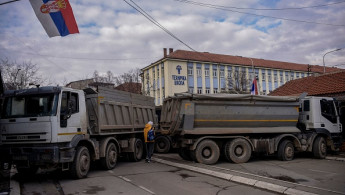Tension soars as main Kosovo border crossing with Serbia closed
Kosovo's biggest border crossing with Serbia was closed on Wednesday as months of tensions again flared, prompting Washington and Brussels to urge an immediate de-escalation of tensions.
Kosovo declared independence from Serbia in 2008, but Belgrade has refused to recognise it and encouraged Kosovo's 120,000 ethnic Serbs to defy Pristina's authority – especially in the north where ethnic Serbs make up the majority.
The latest trouble erupted on 10 December, when ethnic Serbs put up barricades to protest the arrest of an ex-policeman suspected of being involved in attacks against ethnic Albanian police officers – effectively sealing off traffic on two border crossings.
After the roadblocks were erected, Kosovar police and international peacekeepers were attacked in several shooting incidents, while the Serbian armed forces were put on heightened alert this week.
Late on Tuesday, dozens of demonstrators on the Serbian side of the border used trucks and tractors to halt traffic leading to Merdare, the biggest crossing between the neighbours – a move which forced Kosovo police to close the entry point on Wednesday.
"Such an illegal blockade has prevented the free movement and circulation of people and goods, therefore we invite our citizens and compatriots to use other border points for circulation," a Kosovo police statement said.
Pristina also asked NATO-led peacekeepers to clear the barricades that were erected on Kosovo soil.
US, EU urge deescalation
Meanwhile, the European Union and the United States voiced concern over the situation and urged its immediate de-escalation.
"We call on everyone to exercise maximum restraint, to take immediate action to unconditionally de-escalate the situation, and to refrain from provocations, threats, or intimidation," they said in a joint statement.
The EU and US said they were working with Serbian President Aleksandar Vucic and Kosovo's Prime Minister Albin Kurti to seek a political solution to one of the worst flare-ups in years in northern Kosovo.
Earlier on Wednesday, Serbian Defence Minister Milos Vucevic said that Belgrade was "ready for a deal", but did not elaborate.
Vucevic described the roadblocks as a "democratic and peaceful" means of protest and added that Serbia has "an open line of communication" with Western diplomats on resolving the issue.
"We are all worried about the situation and where all this is going… Serbia is ready for a deal," Vucevic told state-controlled public broadcaster RTS.
Russia backs ally Serbia
Northern Kosovo has been on edge since November, when hundreds of ethnic Serb workers in the Kosovo police as well as the judicial branch, including judges and prosecutors, walked off the job.
They were protesting a controversial decision to ban Serbs living in Kosovo from using Belgrade-issued vehicle licence plates – a policy that was eventually scrapped by Pristina.
Kosovo has called on NATO to airlift a former Serbian policeman out of a detention facility due to an escalation in tensions among local Serbs demanding his release. https://t.co/DLIy0Mh7nq
— The New Arab (@The_NewArab) December 23, 2022
The mass walkouts created a security vacuum in Kosovo, which Pristina tried to fill by deploying ethnic Albanian police officers in the region.
Russia voiced support on Wednesday for its ally Serbia and said it was "very closely" following the developments while Germany warned against heightened military presence near the Kosovo border.
"We support Belgrade in all the actions that are being taken," Kremlin spokesman Dmitry Peskov told reporters on Wednesday.
He added however that "Serbia is a sovereign country and it is fundamentally wrong to look for some kind of destructive influence of Russia here".
According to Peskov, "Serbia is defending the rights of Serbs who live nearby in difficult conditions. Naturally they react harshly when these rights are violated."
The EU and several international ambassadors this week condemned four recent attacks against journalists who were covering the flare-up.
Kosovo's 1.8 million population is predominantly ethnic Albanian.





 Follow the Middle East's top stories in English at The New Arab on Google News
Follow the Middle East's top stories in English at The New Arab on Google News


